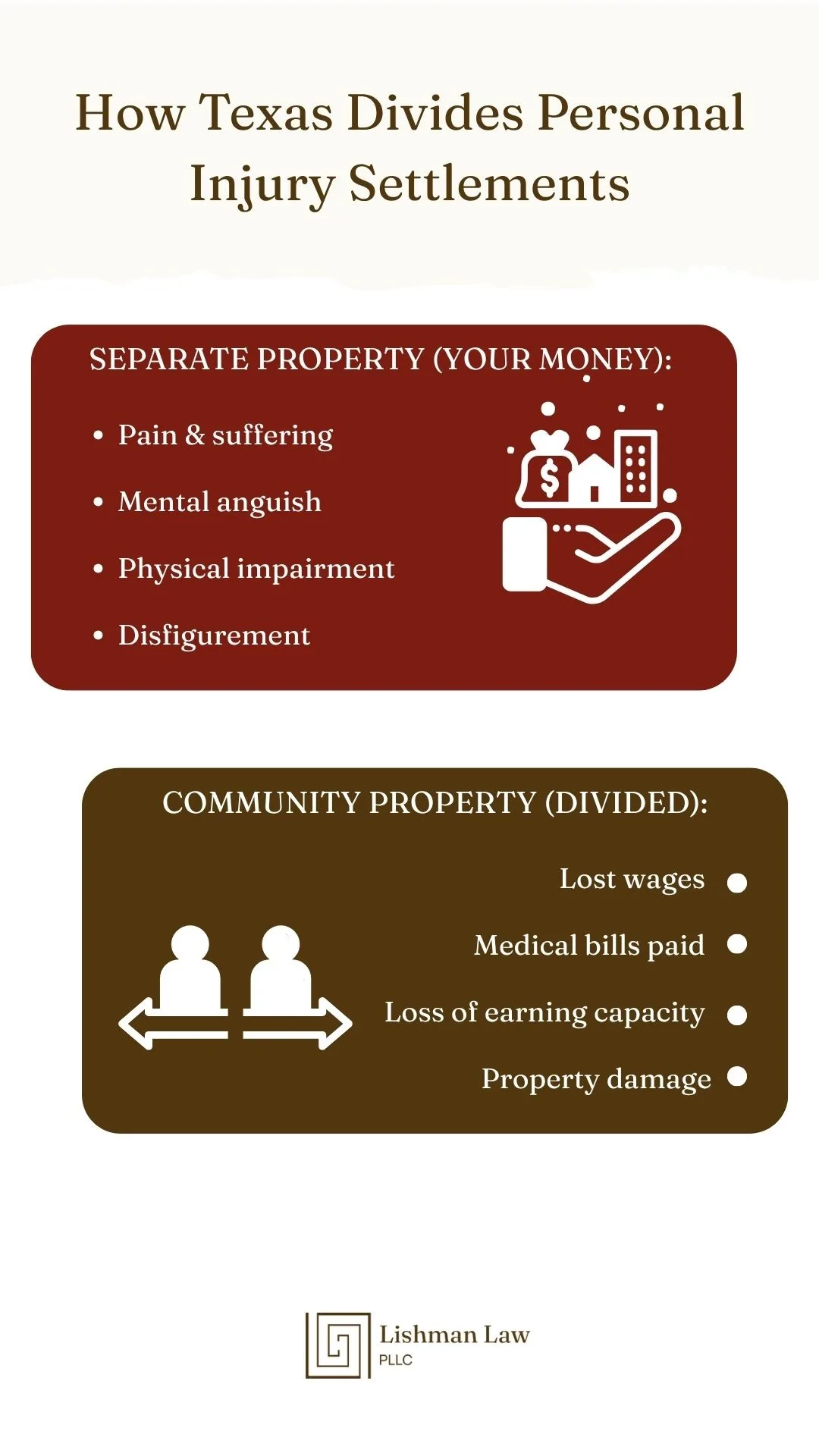Property division in a Texas divorce gets messy when you can't tell what belongs to whom. The line between separate and community property blurs quickly, especially after years of sharing bank accounts, paying bills together, and combining assets without giving it a second thought.
As San Antonio property division lawyers who have guided countless clients through Texas divorce proceedings, we know how critical it is to correctly identify and protect your separate property. This guide walks you through the specific circumstances that commingle separate property and community property, five key exceptions that keep property separate, and practical steps to safeguard your assets.
What Is Community vs. Separate Property in Texas?

Texas is a community property state, which means courts presume all property acquired during marriage belongs equally to both spouses. But important distinctions exist that can significantly impact your financial future.
Community property includes all assets that either spouse acquired during the marriage, such as salaries, wages, bonuses, real estate purchases, vehicles, investment gains, and retirement contributions made between the wedding date and the divorce rendition. Even property in one spouse's name alone counts as community property if it was acquired during the marriage with marital funds.
Separate property consists of three main categories under Texas Family Code Sections 3.001-3.003:
- Property owned before marriage
- Gifts and inheritance received during marriage (even from your spouse)
- Personal injury settlements (excluding lost wages and medical expenses)
The catch? Texas law presumes all property is community property unless you prove otherwise with "clear and convincing evidence". This heightened standard means you need solid documentation and evidence, not just your word.
The burden of proof falls squarely on the party claiming separate property. Without proper documentation, even legitimately separate assets can be divided as community property in divorce proceedings.
Below are the exceptions to community property according to Texas law:
Exception 1. Property Owned Before Marriage
.jpg)
Assets you bring into marriage remain yours alone, provided you can prove pre-marriage ownership and haven't transformed them during marriage. Texas law recognizes pre-marital property as separate, but protecting that status requires careful action.
Real Estate and Vehicles
Keep titles in your name only. Adding your spouse to the deed creates a presumption of gift, potentially converting separate property into community property. For real estate, maintain:
- Original purchase documents
- Pre-marriage appraisals
- Property tax records showing the date of ownership
Investment and Bank Accounts

Pre-marriage account statements prove separate character, but only if you never deposited community funds. Interest and gains may be community property, even if the underlying funds in an account are separate. Opening new accounts after marriage and transferring pre-marital funds still requires tracing to prove the separate character.
Business Interests
A business owned before marriage typically remains separate property, but its growth during marriage can complicate matters. If your spouse works for the company or you use community funds for operational purposes, the community estate may be entitled to reimbursement for value increases.
What is not considered marital property in Texas? Pre-marital assets that remain completely untouched by community funds or effort maintain their separate character throughout marriage and divorce.
Documenting pre-marriage ownership dates and values proves critical for protecting these assets. Without clear records showing when you acquired property and its value at marriage, you risk losing separate property claims entirely.
Exception 2. Gifts Made to One Spouse

Gifts explicitly given to one spouse, whether from third parties or between spouses, remain that spouse's separate property. But proving gift intent requires more than just saying "it was meant for me".
Third-Party Gifts
Birthday presents, holiday gifts, and inheritance from family members qualify as separate property when clearly intended for one spouse only. Documentation matters:
- Gift letters specifying the sole recipient
- Cards addressed to one spouse
- Deposits into individual accounts
- Thank you notes from one spouse
Wedding presents typically count as community property since they're given to the couple jointly. The same goes for housewarming gifts or anniversary presents from friends and family.
Gifts Between Spouses
Texas law allows spouses to gift separate or community property to each other. However, gifts between spouses need written documentation under Texas Family Code Section 3.005. A simple "I give you this" won't work in court. You need:
- Written gift declaration
- Property transfer documents
- Clear intent to relinquish ownership
Important note: Expensive purchases during marriage using community funds (jewelry, cars) are presumed community property unless accompanied by written gift documentation.
Proving gift intent requires demonstrating that the giver intended to benefit only one spouse. Documentation becomes your best defense against community property claims.
Exception 3. Inheritance Received During Marriage
Inherited assets remain separate property regardless of when received during marriage, but careful handling is required to maintain that status. Texas law protects inheritance as separate property, recognizing that family wealth transfers shouldn't become marital assets.
Types of Protected Inheritance
Inheritance stays separate whether received through:
- Direct bequest in a will
- Trust distributions
- Life insurance proceeds paid as the named beneficiary
- Intestate succession (dying without a will)
Keep inherited funds in a separate account under your name only. Never deposit them into joint accounts or mix them with marital funds. Maintain all estate documents showing you as the sole beneficiary.
Common Mistakes That Risk Inheritance

Using inherited money for community benefit can blur the lines:
- Paying off the marital home mortgage
- Funding family vacations
- Covering household expenses
- Renovating jointly-owned property
If you inherit real estate and use it as the marital home, the property itself stays separate, but your spouse may claim reimbursement for community funds spent on mortgage payments, taxes, insurance, and maintenance.
Inheritance starts as a separate property, but commingling or using it for community benefit can change its character. Protect inherited assets by keeping them completely isolated from marital finances.
Exception 4. Personal Injury Settlements

Compensation for personal injuries suffered during marriage is characterized as separate or community property based on what the money represents. Texas law recognizes that some damages/injuries are personal, while others compensate for community losses.
Separate Property Components
Under Texas Family Code Section 3.001(3), these portions remain your separate property:
- Physical pain and suffering
- Mental anguish and emotional distress
- Disfigurement compensation
- Loss of consortium (from the injured spouse's perspective)
Community Property Components
The community estate owns:
- Lost wages during marriage
- Medical expenses paid or owed
- Loss of earning capacity during marriage
- Property damage (vehicle repairs)
Settlement structuring matters. Work with your attorney to clearly designate the amounts as separate or community. Insurance companies often lump everything together, making proper documentation vital.
Personal injury awards require careful structuring to maximize the separate property portion of the award. Proper documentation of each component protects your interests in the event of a later divorce.
Exception 5. Property Protected by Marital Agreements

Prenuptial and postnuptial agreements can override Texas community property rules and designate certain assets as separate, regardless of when or how acquired. These contracts give couples control over property classification beyond default state law.
Prenuptial Agreement Requirements
Valid prenuptial agreements in Texas must be:
- In writing (oral agreements won't work)
- Signed by both parties
- Entered voluntarily without coercion
- Based on fair and reasonable disclosure of assets
Texas Family Code Chapter 4 governs these agreements. Courts generally enforce them unless one party can prove that the signing was involuntary or that the contract was unconscionable, illegal, or that it was signed without an adequate disclosure of finances and assets.
Postnuptial and Partition Agreements

Married couples can sign postnuptial agreements to:
- Convert community property to separate (partition agreements)
- Confirm the property's separate or community character (characterization agreements)
- Define future property acquisitions
- Modify existing property rights
Note: These agreements need consideration beyond the marriage itself, unlike prenuptial agreements.
Common Challenges to Agreements
Courts may invalidate agreements if:
- One party hid significant assets
- Signing occurred under duress
- Terms are unconscionable
- Required formalities weren't followed
Properly drafted marital agreements provide the strongest protection for separate property. Compliance with specific legal requirements ensures enforcement when needed most.
Nuances with Separate Property in Texas Divorce

Beyond basic rules, several subtle issues impact how separate property is treated in Texas divorce proceedings. These nuances often surprise divorcing spouses who thought property division would be a straightforward process.
- Income and appreciation: Income generated from separate property during marriage (such as rent, dividends, or interest) is community property in Texas.
- Business ownership complexities: A business owned before marriage remains separate, but income, distributions, and growth from community labor is typically community. Courts may consider whether increases resulted from market forces or active management.
- Retirement accounts: Pre-marriage retirement values stay separate, while contributions during marriage become community property. You need account statements from your wedding date to prove the separate portion.
- Debt allocation: Separate debts from before marriage remain separate. Debts incurred during marriage are presumed community property regardless of whose name appears on the account, though courts can assign them unequally based on fairness or other factors.
- Hidden assets and fraud: Concealing assets violates fiduciary duties between spouses. Courts can award more than 50% of the community property to the innocent spouse as a form of punishment. Can the wife take all the community property in a Texas divorce? While rare, judges have the authority to award up to 100% of the amount in question for egregious fraud.
These nuances demonstrate why Texas property division necessitates a careful examination of each asset's history. Documentation throughout the marriage protects your interests in the event of divorce.
Protect Your Property Rights
Texas law presumes that all property acquired during marriage is community property, subject to division; however, specific exceptions exist for pre-marital assets, gifts, inheritances, personal injury awards, and property protected by agreements. The key to protecting separate property lies in maintaining clear documentation, avoiding commingling, and acting quickly when filing for divorce becomes likely.
At Lishman Law, our Texas divorce attorneys help San Antonio residents protect their separate property and achieve fair property division in divorce. Sarah Anne Lishman is board-certified in family law. We are experts in Texas property law, working diligently to ensure your assets are properly classified and protected. Contact us today to discuss your property concerns and learn how we can safeguard your financial future through strategic legal representation.

When your spouse claims everything is community property, you need aggressive representation. Our San Antonio attorneys are skilled at tracing assets, proving separate property claims, and securing a favorable property division.






.avif)




